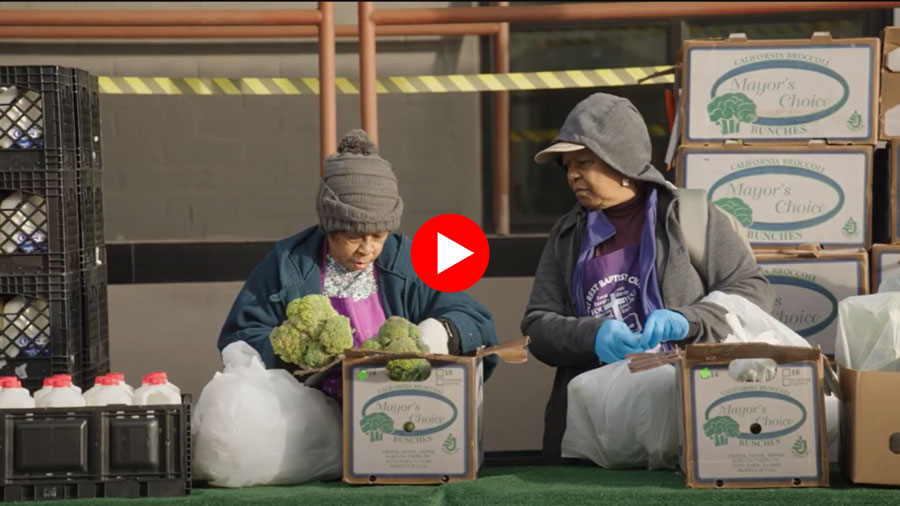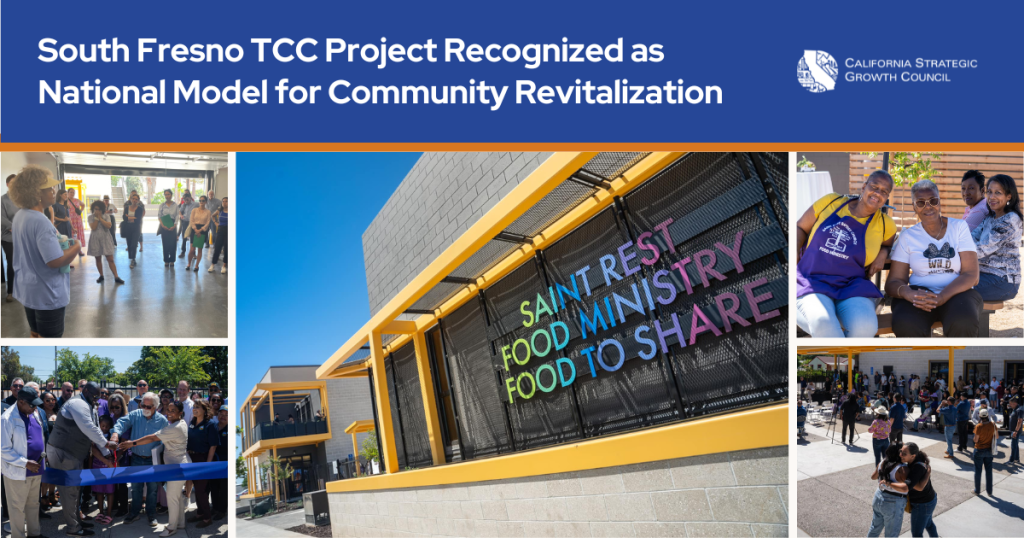Contact: Kalin Kipling-Mojaddedi, kalin.kipling-mojaddedi@lci.ca.gov
FRESNO — The U.S. Environmental Protection Agency has recognized a South Fresno Brownfields redevelopment project — the Saint Rest + Food to Share Hub — as a model for revitalization of contaminated or underused properties.
Where a vacant 6,800-square-foot warehouse once stood, a vibrant community food hub now thrives.
Saint Rest Baptist Church and Fresno Metro Ministry led efforts to convert the contaminated, structurally unsound site into the Saint Rest + Food to Share Hub, which was funded in part by $1.5 million from the City of Fresno’s Transform Fresno initiative, a Round 1 recipient of California Strategic Growth Council’s Transformative Climate Communities Program (TCC). A bakery, gas station and meatpacking plant originally occupied the facility.
“We love to see the impact and success of government-sponsored, community-led projects that bring people together and fill critical gaps,” said Erin Curtis, executive director of the SGC. “The Saint Rest + Food to Share Hub has opened up much-needed access to food, jobs, and even nutrition education and cooking classes in South Fresno – exactly the kind of projects the Transformative Climate Communities Program is proud to support. This is how you get to a California for all.”

The hub officially opened in May 2024 and now serves as a food recovery and distribution center. It offers nutrition education, cooking classes and monthly markets. The project has created 51 local jobs and supports ongoing programs that improve access to healthy food for families in the region.
“In the heart of West Fresno, where access to fresh, healthy food is scarce and the daily reality of our community is marked by economic struggle, the Saint Rest Baptist Church Food Distribution Center stands as a beacon of hope,” said Pastor D.J. Criner of Saint Rest Baptist Church. “We are strategically positioned in the middle of a federally recognized food desert—a place where grocery stores are few, options are limited, and the disenfranchised suffer daily under the weight of systemic neglect. In this ‘mist of emptiness,’ our center is more than a building—it is a lifeline.
“State-of-the-art in design and function, our facility is equipped to store, preserve, and distribute food efficiently and with dignity. Every time our doors open, we serve approximately 400 local families, ensuring that children go to bed nourished, seniors have meals without choosing between medicine and groceries, and working parents have one less burden to carry.
“But beyond the physical provision, our food center represents a deeper truth: that our community is worthy of investment, care and resources equal to any other neighborhood. In a place where systemic disenfranchisement has sought to strip away hope, we have planted a hub of generosity and justice.”
“What was once an old, worn building has been given a new life. Like a phoenix rising from the ashes, it has been reborn with purpose—to feed, to nurture, and to restore hope,” said Bernice Wiley, St Rest Baptist Church Food Ministry administrator. “In this community where far too many live in a food desert, this building is more than bricks and mortar. It is a promise—that healthy food, dignity and care will not be out of reach. It is a symbol of resilience, rising strong to meet the needs of the underserved. And it is a reminder that from renewal comes strength, and from strength the power to nourish both body and spirit.”
“The Saint Rest + Food to Share Hub has become more than a place to recover and distribute food; it’s a living example of what happens when a community comes together,” said Emogene Nelson, executive director of the Fresno Metro Ministry. “Through strong partnerships, we’ve not only filled empty shelves, taught hands-on nutrition classes but also strengthened trust and hope. This work reminds us that when neighbors, organizations, and leaders unite with a shared purpose, we can nourish both bodies and communities.”
Full project costs reached more than $6 million, with contributions from federal, state, local and philanthropic partners. The EPA’s Brownfields Program, which helps communities safely clean up and reuse properties that may be contaminated with hazardous substances, also provided technical assistance and supported environmental assessments, cleanup and planning.
“Passion for community fueled this success. This project could not have happened without the dedication of Fresno Metro Ministry, Saint Rest Baptist Church and the City of Fresno,” said Nicole Cartwright, manager of the TCC Program. “Saint Rest + Food to Share Hub is such a great example of Transformative Climate Communities’ goal to support community-led, transformative efforts that generate environmental, health and economic benefits.”
The SGC’s TCC Program empowers the communities most impacted by pollution to choose their own goals, strategies and projects to reduce greenhouse gas emissions and local air pollution.
With $424 million awarded since 2018 to 37 of the most disadvantaged communities in the state, the program continues to empowers residents, as detailed in recent UCLA research.
About the California Strategic Growth Council
The SGC is a Cabinet-level Council housed within the Governor’s Office of Land Use and Climate Innovation that works to coordinate and work collaboratively with public agencies, communities, and philanthropy to achieve sustainability, fair access, economic prosperity, and quality of life for all Californians. The Council is composed of the leaders of seven state agencies and three public members who work together to build healthy, thriving, resilient communities for all Californians.
Transformative Climate Communities (TCC)
The Transformative Climate Communities (TCC) Program empowers the communities most impacted by pollution to choose their own goals, strategies, and projects to reduce greenhouse gas emissions and local air pollution. The program is administered by SGC and implemented by the California Department of Conservation, along with other partnering state agencies. Round 1 funding was part of California Climate Investments, a statewide program that puts billions of cap-and-trade dollars to work reducing greenhouse gas emissions, strengthening the economy and improving public health and the environment — particularly in disadvantaged communities. For more information, visit California Climate Investments.
